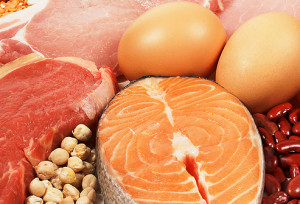How to Choose the Best Quality Protein Sources

High quality protein. You all know you should be having it. But what exactly makes a protein high in quality?
When researchers talk about protein quality, they are essentially referring to the proteins ability to provide Essential Amino Acids to you. Amino acids are the building blocks that make up a protein. Your body uses about 20 different types of amino acids. Some of these amino acids can be manufactured by your body if needed, others can not. The only way you can get these other “essential” amino acids is through the foods you eat. There is no other way. It just so happens the Essential Amino Acids are the most important ones for your health and your body composition results.
The quality of a protein is therefore determined by its Essential Amino Acid content.
The best natural sources of protein that contain all of the Essential Amino Acids are termed “complete proteins” and – sorry vegans – complete proteins come from animal sources of protein. Think meat and dairy.
Quite simply, if you want muscle, you have to eat muscle!!
Funny how eating the flesh of another animal magically gives you everything you need to make flesh of your own. And I don’t care if it runs, flies or swims, nature made it really simple for you. Per 100g of raw weight meat, you are ALWAYS going to get about 20g of quality protein. So, if you’re goal is 40g of quality protein, that’s 200g meat. Easy done. I don’t care if it’s deep sea Perch or Bison roaming the Savannah’s of the America’s, it’s always going to be the same.
It’s simply not good enough to have a “daily total” protein target as muscle protein synthesis is actually determined on a “per meal” basis, not on a “I just hit my goal of protein for the day”. Have you heard about the Dose / Response effect of protein? This is essentially it. And it is definitely not the same as “complementing” your rice and beans together over the course of a day to try and get some balance (sorry again vegans).
Of the essential amino acids, Leucine (one of the Branched Chain Amino Acids) looks to be one of the most important and is required to optimise protein synthesis. At least about 2-3g has been found to maximally stimulate protein synthesis. You want to know why having a scoop of whey post workout is so important? It just so happens to give you the right amount of essential amino acids to optimise muscle protein synthesis.
At the end of the day, about 20-35g of high quality protein per meal is needed to optimise muscle protein synthesis, depending on the source used. As most of my clients know, I will rarely, if ever (EVER) go under this minimum amount for ANYBODY.
If you want a good quality protein source you MUST ensure it:
- Contains Essential Amino Acids to optimise muscle protein synthesis – aiming for about 2-3g Leucine at least. Consume “complete” proteins as a priority
- Consume 20-35g (as a minimum target) whole protein per meal to optimise Muscle Protein Synthesis
- Need to consume it about every 3-4 hours – Muscle Protein Synthesis rates peak about 45-90min following a meal and return to baseline levels about 3 hours after the meal
- Lean sources of protein are better than high fat choices as you maximise the digestion rate and protein density of the food. It’s been written a million times over, but think whey, eggs, milk, chicken, extra lean beef, etc.
- Vegetarian sources of protein are inferior quality as they are usually lacking in one or more of the essential amino acids. No soy is not good enough!
- It’s simply not good enough to just have 3g of Leucine and think you’ve done your job! If you want to maximise the duration of Muscle Protein Synthesis, you need a whole meal!
THIS IS NOT BRO SCIENCE!! THIS ACTUAL SCIENCE. FOUND IN NUMEROUS TEXT BOOKS AND EXTENSIVE RESEARCH ARTICLES THE WORLD OVER.
Don’t ever be one of those people who use arrogance as an excuse for their ignorance. (if you’ve read this far, you’re probably not one of those people anyway)